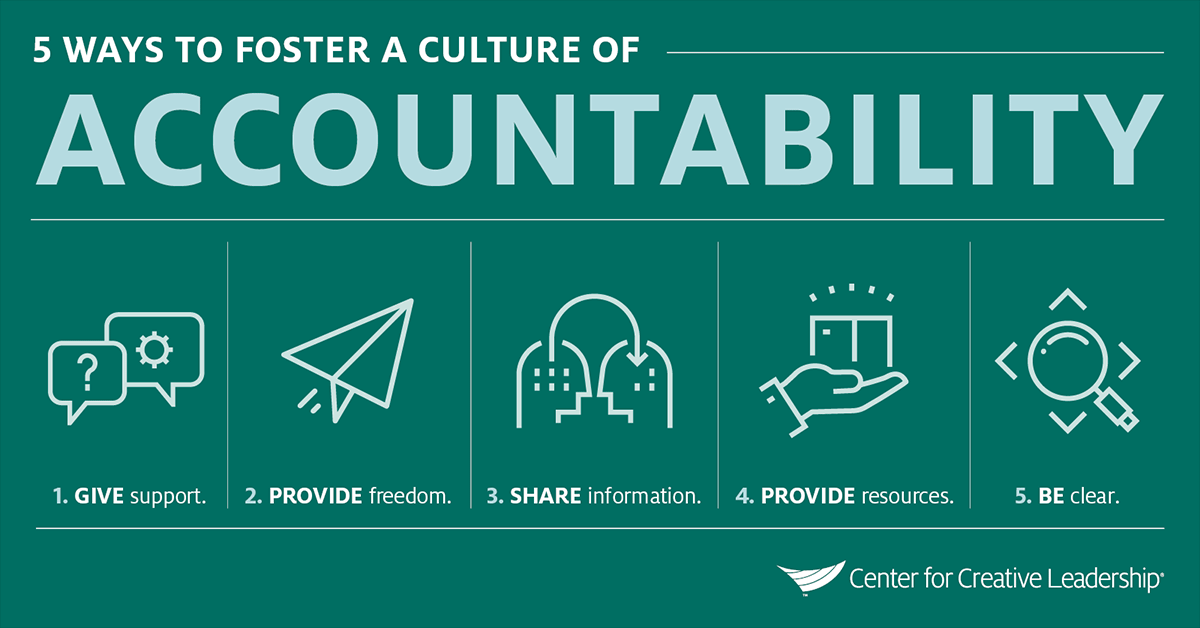Have you ever griped about employees’ lack of initiative? Grumbled over their unwillingness to take ownership of projects, processes, and problems? Then just shook your head, thinking there’s nothing you can do to boost accountability when you’re dealing with problem employees?
The challenge for organizations is that accountability is intrinsic. People have to choose — for themselves — to act with ownership and accountability.
But accountability can flourish in the right environment.
If you want accountable leaders, you need to create the conditions that encourage people to fully own their decisions, as we explain in our guidebook, Accountability: Taking Ownership of Your Responsibility.
Build a Culture of Accountable Leadership
5 Ways to Foster a Culture of Accountability
To foster a culture of accountable leadership, organizations need to do 5 things:
1. Give support.
Employees need support from senior leadership, direct supervisors, and their work teams. Learn to tolerate mistakes and individual differences.
2. Provide freedom.
Give your team the freedom to direct important aspects of the work or to accomplish a goal.
3. Share information.
Employees need access to all information needed to make decisions.
4. Provide resources.
Red tape, tight control, and too-few resources will undermine a sense of ownership and accountable leadership.
5. Be clear.
Clearly communicate the vision and goals, responsibilities, and consequences of action or inaction. Who else is involved and what outcomes are expected?
Creating a Culture of Accountability at Your Organization
Build Accountable Leadership By Reducing Fear & Increasing Trust
To build accountable leadership across your entire organization, you want to build an ownership mentality and culture, and to do that, leaders need to remove unnecessary fear.
When there’s fear, there’s a lack of psychological safety at work, and people tend to hide, hold back, and do only the minimum. Fear can generate many other secondary emotions, too, such as aggressiveness, anger, micromanaging, defensiveness, lack of engagement, and victim behavior.
When team members feel that it’s unsafe to speak up, thoughtful reservations aren’t shared and new ideas aren’t stress-tested, either. To counteract this fear, work to create more psychological safety and build trust, which is critical to team success.
When trust is lost, trust takes a long time to rebuild, so the best advice is to build it consistently over time by showing trust in your team by delegating effectively, being competent in the work, knowing when to communicate openly and when to keep things in confidence, and following through on what you say you’ll do.
In addition, every manager can help to counteract a culture of fear if you:
- Listen and observe behavior in meetings. Is there a balance of inquiry (asking questions) and advocacy (making statements)? Your people may need training to make sure they know how to actively listen to understand one another.
- Catch employees doing something right. Don’t just look to correct them when they do something wrong. Provide effective developmental feedback to foster learning and appropriate risk-taking and accountable leadership. But don’t fall into the trap of over-correcting and failing to hold others accountable, either. Even letting just one person off the hook can do a lot of damage. You send the message to everyone else, why bother?
- Get feedback on fear. Talk to employees and managers who you can count on to be straight with you about their observations about fear and trust. Ask questions like: “Are people encouraged to innovate, rather than conform?” “Is dissent tolerated?” and “What happens when mistakes occur? How does leadership respond?” For example, you or other leaders may be unintentionally undermining, instead of encouraging, innovation by responding in ways that perpetuate fear.
- Create space for experimenting. If you want more innovation, work on growing innovative mindsets in your department to create more room for trial-and-error and to help people learn to respond to new ideas in more productive ways.
Finally, acknowledge and share mistakes. Be upfront about your own missteps, poor judgment, and errors — as well as the lessons learned. Truly accountable leadership is shown when you’re willing to own your mistakes, as well as your successes.
Model the behavior you want to see, and be sure to send a consistent message of accountable leadership. Strive to be a role model yourself, and expect others on your team or department to be accountable leaders, too.
Ready to Take the Next Step?
Your organization can cultivate a culture of accountable leadership with a customized learning journey for your leaders using our research-backed modules. Available leadership topics include Accountable Leadership, Communication, Conflict Resolution, Delegating Effectively, Feedback That Works, Innovation Leadership, Listening to Understand, Psychological Safety & Trust, and more.









